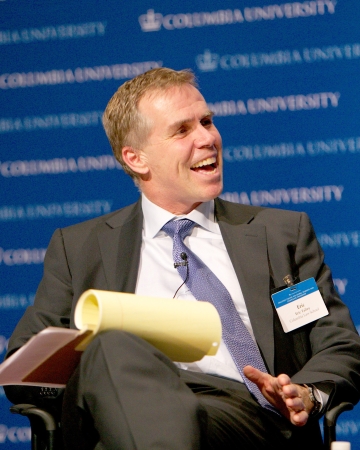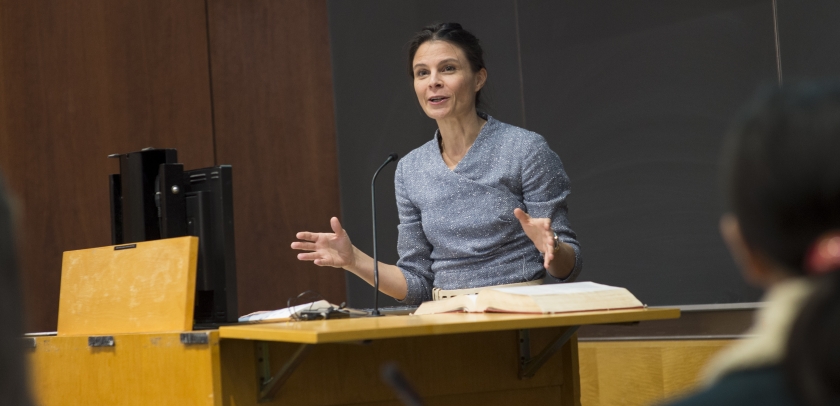Professor Eric Talley Honored With 2022 Willis L.M. Reese Prize for Excellence in Teaching
How a ’77 Olds with a junk transmission put a musician on the road to success in the law school classroom.

For his enthusiasm, energy, and “brilliance,” Eric Talley, Isidor and Seville Sulzbacher Professor of Law, has been awarded the Willis L.M. Reese Prize for Excellence in Teaching by the graduating class of 2022.
Talley, who joined the Columbia Law School faculty in 2015, teaches contract law, corporations, corporate finance, and mergers and acquisitions. As faculty co-director of the Ira M. Millstein Center for Global Markets and Corporate Ownership, Talley has hosted two seasons of Beyond Unprecedented: the Post-Pandemic Economy, a podcast that examines law, business, and capital markets in the aftermath of COVID-19.
Students praise Talley for his ability to make complicated topics understandable. They call him “kind,” “engaging,” and “the smartest, funniest, and most-excited-about-his-course Columbia Law School professor. He is a must-see.”
“He has passion for teaching and cares about his students,” one of them wrote in a course evaluation.
“Professor Talley promised he would help us navigate the mathematical parts [of Corporate Finance] and of course he did,” wrote another student.
In a recent interview, Talley answered a few cold-call questions to outline his path to the podium:
- Why he became a teacher: “Impecuniousness.”
- No, seriously, why he became a teacher: “I was a music major in college and paying my own way. After my first year, I spent every penny of my summer earnings on a 1977 Olds Starfire with a cracked rear window. I drove the car back to college and dropped the transmission when I pulled into town. That was the end of my savings. My tuition was paid, but not next month’s rent. I had to get a job. By a stroke of luck, I ended up as a tutor to high school kids, and I had that job until I went to graduate school. And there, I served as a teaching assistant. Teaching had this great combination of being social and creating a connection, but also forcing me to learn all the topics better. Not only did I like it, but—please don’t tell my boss—I’d be willing to do it for no compensation at all. That was pretty powerful to me.”
- Why he’s still a teacher: “Writing a law review article that your mother and four other people are going to read is a pretty lonely gig. Almost everyone would like to think that they’re making some connection and propelling someone or something forward. With law students, I can see light bulbs go on in the classroom—and then they contact me six years down the road to tell me they just made partner in a firm that does exactly that area of law. The older you get, the more you value the feeling you helped someone else open doors. I love that.”
- What motivates him: “There is a core consideration that goes into my preparation for every class: my abject fear of public humiliation. It’s led me to another guiding principle: Under-promise and over-prepare. I can’t teach a case that I haven’t read in the last 48 hours (even if I’ve taught it 25 times before). Every day I walk into class, I’m still a little nervous. And if I ever get to a point where I’m not a little nervous, I’m going to buy a Winnebago and retire.”
“Professor Talley is passionate enough about the subject that I could get over the fact that I wasn’t passionate about it, and it’s hard to overstate how important that is.” —Contracts student
Talley combines classic Socratic methods with an informal teaching style—he has been known to hold office hours while riding a bicycle in Central Park, and he awards students “I ❤️ Corporations” T-shirts for good performance. (The T-shirts “are highly coveted,” he says.) He frequently collaborates with students on published scholarly papers. An economist as well as a legal scholar, Talley says economic concepts still inform his teaching—though not always with the equations. “You don’t have to be a finance major to understand what’s going on in my class. I think that’s empowering for students, and it’s empowering for me.”
Julian Arato)
On the occasion of his second Reese Prize—he also won the award in 2017—Talley shared a few secrets of teaching success:
- Pick the right subject: “I have the biggest benefit that anyone in teaching has: the power of extremely low expectations. My students don’t come to law school wanting to learn contracts. They want to be constitutional lawyers, human rights lawyers, environmental lawyers, and so forth. And I really can’t blame them. Contracts probably seems like a trip to the dental hygienist for a lot of them. If that’s the starting point, there aren’t too many directions they can go but up. That’s one of the things I love most about the classes I teach: On the surface they look kind of boring and technical, but students are surprised when it turns out it’s not like going to the dentist’s office.”
- Keep it contemporary: “One could teach an entire Contracts class solely with cases that are 75 years old or older. I kid you not. But that’s a missed opportunity, in my opinion. I taught a case this year involving Scarlett Johansson in her contract claim against Marvel, and I got her lawyer to come speak to the class. I think it caused this potentially creaky, cobwebbed old area of law to come alive.”
- It’s not a hypo if it really happens: To illustrate the Brooklyn Bridge hypothetical, a well-used example in contract law, Talley invited his Contracts students to walk across the bridge, promising them coffee and doughnuts at the end of the trek. True to the hypo, he withdrew the offer halfway across the span. A federal judge was waiting on the far side to settle the implied contract dispute. When he teaches insider trading, Talley announces an in-class exercise, then leaks information about it to a select group of class members who then ace the assignment—to the dismay of the rest of the class.
- Read the newspaper: “Coming up with exam questions is really hard. They always have to be fresh. I’ve been at this for over a quarter of a century and all my good ideas I’ve long since spent. Now I depend on The New York Times and the Financial Times and The Wall Street Journal for content. If students also read those newspapers and stumble across a story that they think would be a great Contracts exam question or a great Corporations exam question? There’s a chance that I’m stumbling across that very same story.”
“Best professor ever! He really cared about all of us and it was easy to communicate with him inside and outside the classroom. I will always remember him as the prof who made me want to go into corporate law.” —Contracts student


